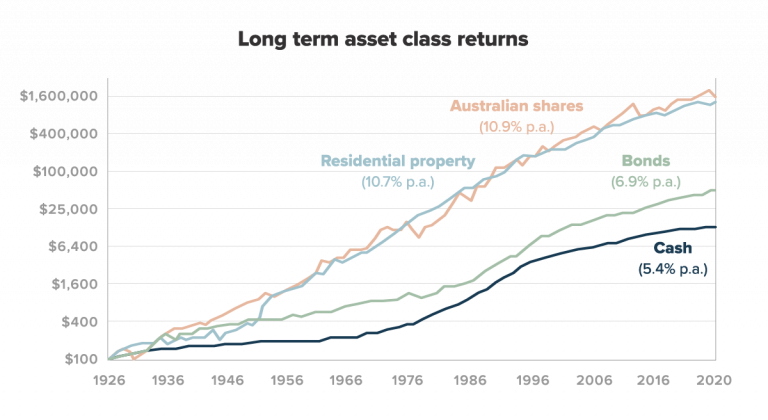The ASX has hit some turbulence recently. A share market correction in the U.S., driven by uncertainty around Trump’s foreign policies, have pulled Australian shares down about 8% from their recent highs. Meanwhile, gold, government bonds, and emerging market shares have held up better, staying near their recent peaks.
When share markets become volatile, it’s important to remember that market dips aren’t actually uncommon. In fact, there’s a 10-20% fall in the market at some point nearly every year.
Despite regular market dips and economic recessions, Australian shares have still earned investors on average 10.9% p.a. since 1926, so it pays to stay invested and be patient when markets have periods of negative returns.

Many investors make the mistake of selling when markets drop, worried that a recession is on the horizon. Right now, there are concerns that the U.S. could enter a recession, potentially impacting Australia. The fear is that conditions will worsen and any recovery will take years.
This reaction is completely understandable. Studies show that people feel the pain of loss twice as strongly as the joy of gains.
In times of market stress, emotions take over. Our fight-or-flight response kicks in, and the amygdala—the part of the brain that processes emotions—goes into overdrive, trying to prevent loss.
But making impulsive decisions can hurt your long-term returns. Avoiding panic is key.
With that in mind, here are six common mistakes to avoid during market downturns so you can stay on track for long-term investing success.
Mistake #1: Selling your portfolio in fear of a recession
Market dips and losses have always been followed by longer periods of gains and recovery.
But if you panic and sell, you risk missing the rebound. By the time the market recovers, buying back in could be much more expensive.
Since World War II, the U.S. has had 12 recessions—yet the share market rose during half of them.
Markets often move ahead of the economy. By the time a recession hits, the market may already be bouncing back.
Stay calm. The key to long-term investing is time in the market, not trying to time it.
We recommend a minimum three-year investment timeframe. The longer you invest, the better your chances of strong returns.
Mistake #2: Changing your portfolio strategy
Changing your portfolio risk in reaction to market performance is a form of market timing and similar to selling your portfolio. Unfortunately, the result is the sale of investments that have fallen the most in price.
There are certain circumstances where it’s appropriate to change your investment strategy, but selling investments at a low point is generally not the way to go.
If you have a tendency to get nervous when your investments go up and down, consider monitoring your portfolios less frequently. This helps prevent your short-term emotions from overpowering the long-term game plan.
Mistake #3: Not topping up your investments (if you have the means)
Market dips can be a good time to top up your investments since you’re able to benefit from buying shares at a cheaper price. Think of it as a Black Friday at your favourite store. Hardly something to run from!
If you set up regular deposits to your investment account, you can manage the risk of market dips and balance out how much you pay for your investments through dollar-cost averaging.
Mistake #4: Not reinvesting your dividends
Even though the value of shares might decline over the short-term, many companies will still be paying dividends.
When markets fall, dividends and distributions can be reinvested at a lower price, helping you benefit even more when share prices go up again.
Mistake #5: Not rebalancing your portfolio
Rebalancing is another way to take advantage of market dips.
Portfolio rebalancing is the process of realigning the assets in a portfolio to desired levels. It involves periodically buying or selling assets in a portfolio and can be difficult to do on your own.
Stockspot automatically rebalances our clients’ portfolios.
In March 2020, we sold gold and bonds which had performed well and invested the profits into share markets that had collapsed. The share market rebounded, and as a result, many of our clients were up 40% or more on the extra shares we bought for them when we rebalanced again in November 2020.
Mistake #6: Not diversifying your investments
While the broad share market index is down, there are sectors that have fared much worse during this market dip. For example Telsa shares are down 53% from their recent high and NVIDIA is down 30%.
With a well-diversified portfolio spread across multiple asset classes, you can ride out market dips without stressing over major losses that come from investing in a single stock or sector.
Index investing comes out stronger from each market crisis because loss-making active investors and day traders convert to a diversified indexed approach.
At Stockspot, we prepare for uncertainty and dips in the market by investing across a broad range of different investments.
Defensive assets like bonds and gold are a proven way to protect a portfolio and provide a cushion when markets dip.
If you diversify, you’ll avoid large losses from a single investment. This can make a big difference to your sanity when markets fall.
Research has shown that setting a diversified investment strategy and ignoring the movements of the market leads to much better outcomes than trying to outsmart the market.
In short, if you’ve focused on setting yourself up with a diversified portfolio that’s rebalanced appropriately, simply stick to your strategy, stay invested, and perhaps top up if you have the cash reserves.





